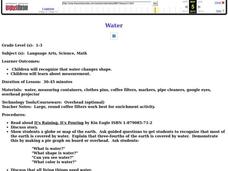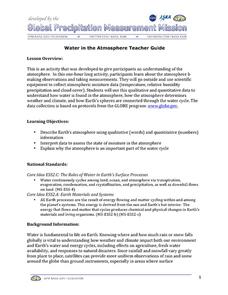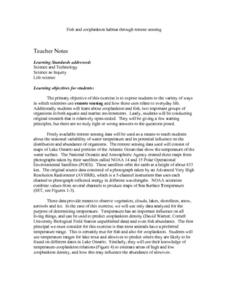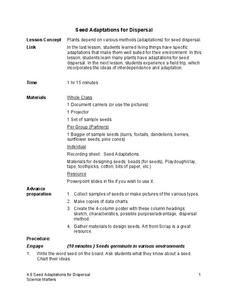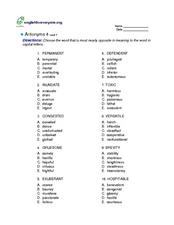Curated OER
Insect Classification
Sixth graders learn the classification system of living organisms. They identify general body parts of an insect, learn insect classification into orders, families, genus and species, and classify given insects by using a scientific...
Curated OER
Exploring the National Marine Sanctuaries: A Lesson in Habitats and Human Impacts
Students examine the marine sanctuaries in the Pacific and Atlantic Oceans. They discover the interdependence of all living things and work together in groups to create a poster about what they have discovered during the lesson. They...
Curated OER
Systems of the Body
Third graders gather information by questioning, forming hypothesis, collecting and analyzing data, reaching conclusions and evaluating results, and communicating procedures and findings to others. Then they demonstrate an understanding...
Polar Trec
Animal Monitoring Introduction
Not only do mealworms taste great, they are also great for classroom science lessons. In pairs, young scientists observe and record what they see as they check out what their mealworms are doing from minute to minute. Each minute...
American Museum of Natural History
What do you know about Biodiversity?
What do your classes know about biodiversity? A 10-question online quiz asks questions related to biodiversity and species groups. As learners answer questions, they click on links to additional information. The lesson could be an option...
Curated OER
Visual Vocabulary
Students interpret and name the vocabulary termed acted out by the mime. In this science/language arts/physical education lesson plan, students are given a set of vocabulary terms to discuss within their group. Next, students place all...
Montana State University
Everest Extremes: Biodiversity
How many animals can live in a climate as cold as Mount Everest's? Find out with a science instructional activity all about biodiversity. Activities include research, presentations, group work, coloring maps, and a simulation of a food web.
Curated OER
PLANT LIFE CYCLES
Student learns about the life cycle of plants by watching a time-lapse video. This activity provides pupils with further evidence that all living things grow and change as they progress through their life cycle.
Curated OER
Unit 2 Sun & Stars
Young scholars describe stellar objects using terms such as stars, planets, satellites, orbits and light. In this sun and stars unit, students research stellar objects through seven individual lessons discovering star characteristics,...
Curated OER
Water
Students complete activities to examine the properties of water. In this water science lesson, students read a book about water's forms and study a map or globe of the Earth to investigate water. Students discuss living things that need...
ARKive
Temperate Rainforest in the Pacific Northwest
Explore the amazing temperate rainforest of the Pacific Northwest. Your class starts by investigating the animals and plants of the Northwest, specifically Washington, and then research an animal population common to the area. In small...
Curated OER
Day and Night
Good Night, Moon is a classic little ones absolutely love. It's a sweet book that can be used, as in this lesson plan, to start a conversation about the difference between night and day. After reading the story, the class brainstorms...
Lerner Publishing
Teaching Habitats
What makes up a habitat? Use this resource to engage first graders in the exploration of desert, wetland, forest, and ocean habitats. Youngsters classify plants and animals into the four distinct habitats through drawings and cutting and...
Curated OER
Water in the Atmosphere
A slide show serves as the backdrop for a instructional activity on the moisture in Earth's atmosphere. Through it, mini meteorologists learn about the attributes of the atmosphere and actually use data-collecting weather tools to make...
Curated OER
Fish and zooplankton habitat through remote sensing
Students are exposed to the variety of ways in which scientist use remote sensing and it used in everyday life. They investigate about zooplankton and fish. Students list the two important groups of organisms in both aquatic and marine...
Curated OER
Minerals of the Earth
Unearth this gem of a resource to use in your geology unit! With colorful images, bullet-point text, and links to related videos, it deals with the characteristics, properties, and identification of minerals. There are also slides...
It's About Time
Succession in Communities
What occurs following a natural disaster? High schoolers research this question and others as they investigate natural succession after a disaster. First, as they differentiate between primary and secondary succession, they explain how...
Science Matters
Seed Adaptations for Dispersal
After a grand conversation about seeds, adaptation, and dispersal, scholars work collaboratively to examine seeds and record their findings on a four-column chart. Small groups share their observations and further discuss seed...
Curated OER
Antonyms 4: Level 7
A dynamic way to build vocabulary is to find the perfect antonym for a word under study. This instructional activity, whether used for individual practice or for group work, is sure to enrich the vocabulary of your pupils. Of particular...
Curated OER
Water in Earth's Hydrosphere
Environmentalists test stream water for temperature, pH, and turbidity. Each group shares their information and then the class makes an overall evaluation of the water quality. A slide show sets the backdrop for the teaching portion and...
Curated OER
Studying Living Organisms
Pupils discover and discuss the differences between prokaryotes and eukaryotes. Using a microscope, they examine various prepared slides of prokaryotic and eukaryotic organisms.
Curated OER
The Living Environment
Students use a spoon, clothespin, scissors, and toothpicks to simulate how animals get food in their environment. In this environment lesson plan, students learn about the adaptations animals make in order to survive.
Curated OER
Habitats
Learners investigate the habitats of living things and the cycle of the food chain. In this scientific inquiry online instructional activity, students examine the habitats of plants and animals as well as the food chain as they sort...
Curated OER
Cell Organelles
Learners explore biology by researching living cells. In this living organism lesson, students participate in a role-playing activity in which all the learners in class form one plant cell by portraying specific parts of a cell. Students...











